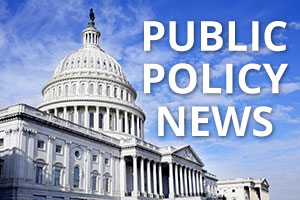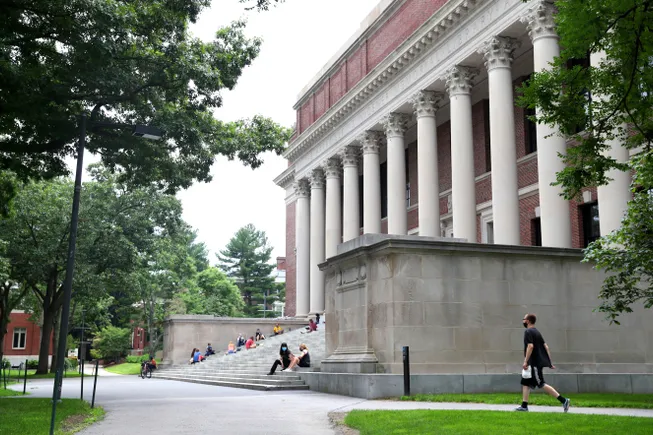Get stories like this delivered straight to your inbox. Sign up for The 74 Newsletter
New international students enrolling at U.S. colleges declined sharply this fall, a concerning development for universities that rely on those students for research, tuition revenue and the diversity they bring to campus culture. It could, however, create more space for U.S. residents at those campuses.
Enrollments of new international students were down 17% compared to fall 2024, according to a report released Monday by the Institute of International Education, which surveyed more than 800 colleges about their fall 2025 enrollments. The institute, a nonprofit organization based in New York, publishes an annual report that examines the enrollment of international students.
The fall data was not broken down by state, so the scale of decline in California is unclear. At USC, which enrolls more international students than any other California college, overall enrollment of international students is down 3% this fall, according to a campus spokesperson. That includes returning and first-time students, so the drop could be much higher for new arrivals. USC this fall enrolls about 12,000 international students, or 26% of its total student population, according to the college. About half of those students are from China.
The declines come amid a changing landscape for international students under the Trump administration, which has delayed visa processing, created travel restrictions and pressured some campuses to recruit and admit fewer students from other countries. The colleges surveyed this fall by the institute cited visa application concerns and travel restrictions as top factors in the decline.
“We are confronting major headwinds with what I would say are poor policy decisions that the administration is taking. And that is creating a climate for international students that signals that you’re not welcome here,” said Fanta Aw, CEO of NAFSA, a nonprofit for international education and exchange.
President Donald Trump has said that he wants to lower the number of international students at U.S. colleges to leave more room at those campuses for U.S. students. “It’s too much because we have Americans that want to go there and to other places, and they can’t go there,” he said earlier this year, referencing the number of international students at Harvard and other universities.
For the full 2024-25 academic year, new international student enrollments were down by 7%, driven by a 15% drop among new international graduate students, compared to 2023-24. However, the number of new undergraduates was up by 5%. Trump took office in January, just before the start of the spring semester at most colleges.
In the U.S., students from India were the largest group of international students, accounting for 30.8% of all international students, followed by students from China, with 22.6% of enrollments.
In the 2024-25 academic year in California, the largest share of international students were from China, and they made up 35.4% of enrollments, followed by students from India at 20.9%. Overall enrollment of international students in California was down 1.1% in 2024-25.
USC enrolled the most international students of any California university, followed by four University of California campuses: Berkeley, Los Angeles, San Diego and Irvine. According to the report, the total number of enrolled international students were: 12,020 at Berkeley, 10,769 at UCLA, 10,545 at San Diego, and 7,638 at Irvine.
Across the state, international students make up about 7% of enrollments at four-year colleges, according to the Public Policy Institute of California. They make up a large share of graduate students, accounting for 31% of graduate students at UC campuses, 15% at private nonprofit universities, and 12% at California State University campuses.
Freya Vijay, 20, a third-year student from Canada studying business administration at USC, said she always planned to come to the United States for college.
“In terms of business and just the economy, you have Wall Street, you have New York, Chicago, L.A., and San Francisco, all these big cities that dominate what’s going on in the world,” she said. “So immediately, in terms of opportunity, my mind was set on the States.”
In addition to visa and travel restrictions, the Trump administration has directly requested — or threatened, as some have called it — California campuses to limit enrollments of international students. The administration’s compact offer to USC last month would have forced the university to cap international enrollment at 15% for undergraduates and limit enrollment from any one country to 5%.
USC has since rejected the compact, which also would have required the university to make a number of other changes, including committing to “transforming or abolishing institutional units that purposefully punish, belittle and even spark violence against conservative ideas.”
Separately, in a settlement proposal to UCLA, the Trump administration calls on the campus to ensure that “foreign students likely to engage in anti-Western, anti-American, or antisemitic disruptions or harassment” are not admitted. UCLA is still in negotiations with the administration and has not yet reached a deal. The Trump administration has charged the campus with antisemitism and civil rights violations.
Even amid the turmoil, experts say they expect California universities to continue recruiting international students. Julie Posselt, a professor of education at USC’s Rossier School of Education, noted that at research universities, much of the research is being carried out by international graduate students.
“Especially in STEM fields, international students are really central to the research functions of universities,” Posselt said. “Enrolling international students is not optional. It is absolutely a part of the fabric of what makes universities great.”
On top of that, colleges have financial incentives to enroll international students. That’s especially true at UC campuses, which charge international students and students from other states much higher rates of tuition than California residents. In the 2026-27 academic year, new international and out-of-state undergraduates at UC will pay nearly $52,000 in tuition, more than triple what in-state students will be charged. Nonresidents in graduate programs also generally pay higher rates than residents.
Facing pressure from the state Legislature to make more room for California residents, UC in 2017 passed a policy to cap nonresident enrollment at 18%, with a higher percentage allowed for campuses that were already above that mark. But the system still gets significant tuition revenue from nonresidents, including international students, which UC says supports the system’s core operations and helps to lower the cost of attendance for California residents.
In a Nov. 10 interview with Fox News, Trump seemed to acknowledge the importance of international students, saying colleges might “go out of business” without them.
“You don’t want to cut half of the people, half of the students from all over the world that are coming into our country — destroy our entire university and college system — I don’t want to do that,” he said.
International students also bring diverse perspectives and “a richness to the campus culture,” said Stett Holbrook, a spokesperson for the University of California system. “That’s something we really appreciate and try to cultivate.”
At USC, the presence of international students from more than 130 countries means there are “innumerable opportunities at USC to encounter different perspectives” and “experience new cultures,” a spokesperson said in a statement.
Vijay, the USC student from Canada, said she regularly boasts about USC to friends, adding that she hopes attending remains an option for other international students.
“I always think it’s just such a great opportunity and that no international student should ever take it for granted,” she said. “I wish other internationals could experience it.”
This story was originally published on EdSource.
Did you use this article in your work?
We’d love to hear how The 74’s reporting is helping educators, researchers, and policymakers. Tell us how








